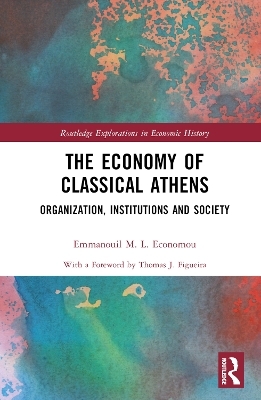
The Economy of Classical Athens
Routledge (Verlag)
978-1-032-56154-7 (ISBN)
In parallel to the development of democracy, the Athenians of the Classical period established a series of sophisticated economic institutions for the time through which they developed a maritime and commercially oriented economy. This book provides a thorough analysis of this transformation and the functioning of the Athenian economy during the Classical period. Through the approach of New Institutional Economics (NIE), the book explores the establishment of key institutions including property rights protection, the legal protection of commercial contracts, prices determined by the forces of supply and demand, institutions against profiteering, banking services, the provision of loans through interest rates, consumer credit, insurance companies and a (primitive) version of joint-stock companies. Furthermore, the book focuses on the structure of the public sector, on how the state budget was determined and on how decisions on public revenues and expenditures were made. It also provides an integrated and detailed analysis of the social welfare policies that were implemented through the provision of a variety of public goods in Classical Athens. Moreover, it focuses on a series of socio-economic aspects such as the social status of women, slaves and foreigners and the viewpoints of prominent Athenian philosophers regarding economic organization. Finally, the book investigates whether an Athenian economic-political model of governance, based on a combination of advanced economic institutions (of free market type logic, even if in a primordial form) and direct democracy principles, can provide any lessons for modern societies. The book will be of great interest to readers of the economy, history and society of Ancient Greece as well as economic historians, ancient historians and policymakers more broadly.
Emmanouil M.L. Economou is an Assistant Professor of History of Economic Institutions at the Department of Economics, University of Thessaly (Greece). He is a member of the Laboratory of Economic Policy and Strategic Planning (L.E.P.S.PLAN) in the same department. He is also a member of the Laboratory of Intelligence and Cyber-Security, Department of International and European Studies, University of Piraeus (Greece). His research focuses on Economic History, Institutional Economics, International Political Economy and Defense Economics. He is the author of nine books (five in English and four in Greek) with acclaimed publishing houses such as Routledge, Springer and Cambridge Scholars Publishing. He has contributed to the international academic bibliography with 65 papers in distinguished peer review journals, and in English and Greek collective volumes (scientific books). Contributions in peer review journals include, among others, the Journal of Institutional Economics (3), Defence and Peace Economics (2), Sustainability, European Journal of Law and Economics, Peace Economics, Peace Science and Public Policy (2), Economics of Governance, Evolutionary and Institutional Economics Review, Homo Oeconomicus, Journal of Financial Economic Policy and Journal of Risk and Financial Management (4). He is also a reviewer in the following highly distinguished journals: American Political Science Review, Journal of Institutional Economics, Cliometrica, Public Choice, Peace Economics, Peace Science and Public Policy, Investigaciones de Historia Económica - Economic History Research (EHR) and Journal of Risk and Financial Management. Furthermore, he has 79 publications of discussion papers (64 in English, in the IDEAS RePec – Munich International Library and 15 as “ΚΟΙΔΑ” discussion papers published by the L.E.P.S.PLAN Laboratory). He has participated in 43 international and Greek conferences. He often writes in Greek press on economic, historical and defense issues.
Chapter 1: Introduction. Chapter 2: The ancient economy: Some further introductory issues. Chapter 3: Adopting a ‘turn to the sea’ strategy and the transformation of the Athenian economy. Chapter 4: The protection of private property and the rule of law. Chapter 5: The Athenian market. Chapter 6: The financial institutions of the Athenian economy. Chapter 7: The role of money in the economy. Chapter 8: The Athenian Public Sector and State Budget. Chapter 9: Economic growth policies in Classical Athens. Chapter 10: Social Welfare policies through the provision of public goods. Chapter 11: Epilogue: The Athenian city-state culture. Economy, freedom, democracy and the rule of law.
| Erscheinungsdatum | 10.10.2023 |
|---|---|
| Reihe/Serie | Routledge Explorations in Economic History |
| Zusatzinfo | 30 Tables, black and white; 11 Line drawings, black and white; 26 Halftones, black and white; 37 Illustrations, black and white |
| Verlagsort | London |
| Sprache | englisch |
| Maße | 156 x 234 mm |
| Gewicht | 830 g |
| Themenwelt | Geschichte ► Allgemeine Geschichte ► Altertum / Antike |
| Geschichte ► Teilgebiete der Geschichte ► Wirtschaftsgeschichte | |
| Wirtschaft ► Volkswirtschaftslehre ► Mikroökonomie | |
| ISBN-10 | 1-032-56154-8 / 1032561548 |
| ISBN-13 | 978-1-032-56154-7 / 9781032561547 |
| Zustand | Neuware |
| Haben Sie eine Frage zum Produkt? |
aus dem Bereich


